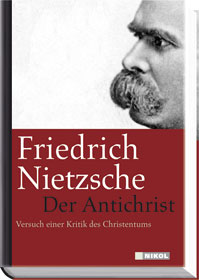In Christianity, the instincts of the subjugated and oppressed come to the fore: the lowest classes are the ones who look to it for salvation. Casuistry of sin, self-critique, and inquisitions of conscience are sources of employment, cures for boredom; affects inspired by a Great Power called ‘god’ are continuously cultivated (through prayer); the highest is considered unachievable, a gift, ‘grace’.
There is no sense of a public presence; the hide-away, the unlit room is Christian. The body is an object of hatred, hygiene is rejected as sensuousness; the church defends itself even against cleanliness (—the first Christian edict following the expulsion of the Moors was the closure of the public baths—there were some 270 in Cordoba alone).
There is a distinctively Christian sense of cruelty towards yourself and others; hatred of heterodoxy; the will to persecute. Dismal and upsetting thoughts have pride of place; the most highly prized states, described with the highest names, are epileptoid; diet is constructed to promote morbid appearances and over-stimulate the nerves. It is Christian to harbour a deadly hatred of the masters of the earth, the ‘nobles’—while maintaining a hidden, secret edge of competition (—they can have the ‘body’, we only want the ‘soul’…).
It is Christian to hate spirit, to hate pride, courage, freedom, libertinism of the spirit; it is Christian to hate the senses, to hate enjoyment of the senses, to hate joy in general…

2 replies on “The Antichrist § 21”
Reblogged this on My Jorney.
It’s not greatly different from the attitude and outlook of jew Bolshevism and Marxism.